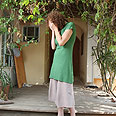
Gender identity sought between pages of Gemara
Questions raised about G.'s gender identity shared only with God. 'Only He was there,' says G. Today, as Orthodox woman, G. says proudly, 'It's possible to be transgender and religious'
G. was born to a religious family. For years, just like everyone else, he went to synagogue, attended a religious youth group, and studied in a religious school. However, deep inside him, the feeling that he is really a woman, and not a man, nagged at him.
Just five years ago, G. decided to break out of the accepted norms and become transgender. Today, G. is a religious Orthodox woman who keeps mitzvoth and goes to synagogue, where she sits in the women's section.
G.'s story started many years ago as a young boy in a religious school in the center of the country. At the age of 11, among the pages of Gemara, piercing questions started to emerge in his heart regarding his gender identity. Though he continued to say daily the prayer "Praised is God for not making me a woman," he had already decided in his heart that he is not a man, but a woman.
However, living at the heart of the religious establishment, implementing such decision remained far from practicable.
"Even after discovering my identity as a woman at the age of 11, I didn't have anyone to talk to about it at school. Talking about such topics was disallowed. I continued on the path laid for me by the society I grew up in. I didn't ask questions, and I did not speak out about my inner feelings," G. said.
As such, after finishing high school, G. enlisted in the IDF. At the end of his service, he removed his kippah and embarked on a journey to find his inner self and to delve into the questions of his gender identity.
"I came from a religious society. This is what I knew, and nothing else. At a certain point, when you're confused about your gender identity, you are alone. Even though I was a secular person who had taken off his kippah after the army, God was with me throughout that period of solitude. Only He was there, Him and only Him. When I wanted to speak with someone, I spoke with Him."
'Not ashamed of it'
Five years ago, G. decided that he could no longer continue a life full of frustration and alienation. He decided to take a stand, and simultaneously started on a process of renewed closeness with religion. Alongside his newly forged gender identity, a stronger religious identity coalesced.
"Today, I keep the mitzvoth. I try to bring holiness into my life, and this does me good. It is possible to be transgender and religious," she said with confidence.
Even today, G., in her 30s, continues to pray in a synagogue – an Orthodox synagogue – next to her home in the center of the country.
"I go to an Orthodox synagogue. They receive me very pleasantly there. It is an open community and everyone who comes to the synagogue knows me, my past, and my present. No one makes a big deal about it. There is a women's section and a men's section at the synagogue. I sit in the women's section and am not ashamed of it. There is something nice about it, having come to terms with my situation and having the community come to terms with who I am. I pray and then go home. I keep Shabbat according to halacha."
G. is fluent in religious texts and is well familiar with halacha and its unbending approach to the issue.
"I am in contact with Orthodox rabbis," she said. "When you speak with them one-on-one, when you are the son of the religious neighbor they know – all of a sudden their minds open up. It's nice. But in their declarations to the outside world, the whole issue of transgenders and homosexuals greatly scares them. This is why I always say that the sought-after change in the relationship with us will come only from within the community, from education.
"I, personally, know another few transgenders or people with alternative gender identities within the religious community. We can be found throughout the broad spectrum of the religious community – from
the Bnei Akiva youth group to haredi society. I also tell the rabbis that they must recognize our existence, and that they have a responsibility for our wellbeing as members of the community and as students. They must connect us to them and not ostracize us.
"I hope change comes soon because I know of religious people in my situation who are deliberating between quitting religion and staying religious. Personally, after quitting religion and returning to it after coming to terms with who I am, feel much better today," said G. proudly.
- Follow Ynetnews on Facebook










